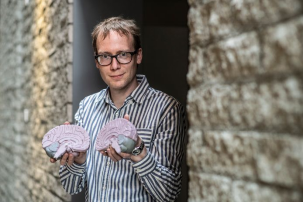主讲人:Dr. Floris P. de Lange
讲座时间:16:15, December 2nd
与会方式:Zoom(864 8101 8536; Passcode: 1111)
主办单位:Center for the Cognitive Science of Language, Beijing Language and Culture University
讲座简介:In order to understand language, we need to transform ambiguous stimulus input into a hierarchy of increasingly abstract representations. It has been argued that the brain relies on prediction to guide the interpretation of incoming information. Such a “predictive processing” strategy has not only proven effective for artificial systems processing language, but may also be a canonical neural computation in the human brain. In my talk, I will discuss recent work from my lab in which we investigated how prediction is used in language comprehension. I will discuss predictive mechanisms during reading and listening, capitalizing on fMRI, EEG and eye tracking data.
专家简介:Floris P. de Lange is a full Professor at Radboud University in Nijmegen, Netherlands. He is also a Principal Investigator (PI) of the Predictive Brain Lab at the Donders Institute for Brain, Cognition and Behabiour. He obtained a Master's degree (cum laude) in Artificial Intelligence in 2003, and a Ph.D. degree (cum laude) in Cognitive Neuroscience in 2008, both at Radboud University. From 2007-2009, he was a post-doctoral fellow in the lab of Prof. Stanislas Dehaene at Neurospin, Paris, France. From 2009, Floris established the Predictive Brain Lab at the Donders Institute, where he study how various forms of prior knowledge modify perception and decision-making. In his lab, they use a complementary set of techniques (non-invasive brain measurements in humans, MEG and fMRI), behavioral measurements, and computational models to investigate this interplay. His work have been published in amount of high-quality journals such as Nature Neuroscience, Nature Review Neuroscience, Neuron, Nature Communications, Trends in Cognitive Neuroscience etc..
